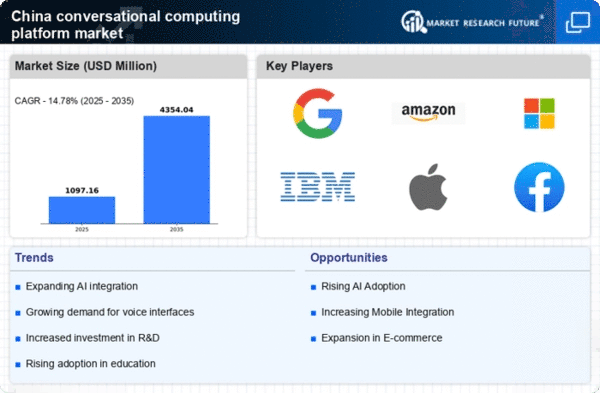Growing Demand for Customer Engagement
The increasing emphasis on customer engagement in various sectors is driving the conversational computing-platform market. Businesses in China are recognizing the need for enhanced customer interaction, leading to a surge in demand for platforms that facilitate real-time communication. According to recent data, the market for customer engagement solutions in China is projected to grow at a CAGR of 25% over the next five years. This growth is largely attributed to the rising expectations of consumers for personalized experiences. As companies strive to meet these expectations, they are increasingly adopting conversational computing technologies to streamline interactions and improve customer satisfaction. The conversational computing-platform market is thus positioned to benefit from this trend, as organizations seek to leverage advanced technologies to foster deeper connections with their clientele.
Rise of E-commerce and Online Services
The rapid expansion of e-commerce and online services in China is a significant driver for the conversational computing-platform market. With the e-commerce sector projected to reach $2 trillion by 2025, businesses are seeking innovative ways to enhance customer interactions. Conversational platforms are being integrated into online shopping experiences to provide instant support and personalized recommendations. This trend is particularly evident in the retail sector, where companies are leveraging chatbots and virtual assistants to improve customer service and streamline the purchasing process. As the demand for seamless online experiences continues to grow, the conversational computing-platform market is expected to thrive, offering solutions that cater to the evolving needs of consumers in the digital landscape.
Increased Investment in AI Technologies
Investment in artificial intelligence technologies is surging in China, which is positively influencing the conversational computing-platform market. The Chinese government has prioritized AI development, with plans to invest over $150 billion in the sector by 2030. This influx of capital is fostering innovation and encouraging the development of advanced conversational platforms. Companies are increasingly allocating resources to integrate AI capabilities into their operations, enhancing their ability to engage with customers through conversational interfaces. As a result, the conversational computing-platform market is likely to experience robust growth, driven by the demand for AI-enhanced solutions that can provide more efficient and effective communication channels.
Advancements in Natural Language Processing
Natural Language Processing (NLP) technologies are evolving rapidly, significantly impacting the conversational computing-platform market. In China, advancements in NLP are enabling platforms to understand and process human language more effectively, which enhances user experience. The market for NLP solutions is expected to reach $2 billion by 2026, reflecting a growing investment in AI-driven technologies. These advancements allow for more sophisticated interactions, making it easier for users to communicate with machines. As businesses increasingly adopt these technologies, the conversational computing platform market is likely to see a corresponding rise in demand for NLP capabilities, essential for creating intuitive and responsive systems that can engage users in meaningful conversations.
Shift Towards Automation in Business Processes
The shift towards automation in business processes is a key factor propelling the conversational computing-platform market. In China, organizations are increasingly adopting automation technologies to improve efficiency and reduce operational costs. This trend is evident across various industries, including finance, healthcare, and customer service. By implementing conversational platforms, businesses can automate routine inquiries and streamline workflows, allowing human agents to focus on more complex tasks. The market for automation solutions is expected to grow significantly, with estimates suggesting a CAGR of 30% over the next few years. As companies continue to embrace automation, the conversational computing-platform market is poised to benefit from the demand for solutions that facilitate automated interactions and enhance overall productivity.
















